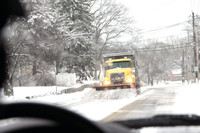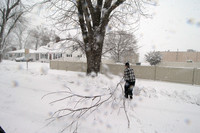By JOHN HOWELL Mayor Scott Avedisian was on his cell phone. The snow had changed to rain that ticked heavily on the windshield as the wipers flicked back and forth. DPW director and chief of staff David Picozzi was at the wheel. He was stopped in front
This item is available in full to subscribers.
We have recently launched a new and improved website. To continue reading, you will need to either log into your subscriber account, or purchase a new subscription.
If you are a current print subscriber, you can set up a free website account by clicking here.
Otherwise, click here to view your options for subscribing.
Please log in to continue |
|


Mayor Scott Avedisian was on his cell phone. The snow had changed to rain that ticked heavily on the windshield as the wipers flicked back and forth.
DPW director and chief of staff David Picozzi was at the wheel. He was stopped in front of Ward 7 Councilman Steve McAllister’s home in Nausauket.
“Welcome to Dave’s big snow adventures,” Avedisian said into the phone.
Moments later McAllister emerged wearing a hooded coat, boots and gloves, which he really won’t need in the warmth of the Tahoe. This was McAllister’s introduction to a storm that was forecast to deliver a one-two punch of 12 to 18 inches of snow and steady winds of 35 mph, gusting to 50 mph. But forecasts aren’t always precise, and Picozzi was thankful for that. Snow changed to rain sooner than initially thought and while it made for heavy, mushy stuff, once roads were cleared they would stay that way. Of course, even then, Picozzi knew people would push snow into the street and cleanup crews would have to return.
“It looks like we’re getting lucky,” says Picozzi as soon as McAllister closed the door. Picozzi did a mental calculation. He figured if the storm was spent by 4 p.m., the cleanup will be finished by 9 and everyone can go home. It all came together even quicker than that.
Picozzi said Wednesday crews were sent home by 6:30 to 7 p.m. and that the operation shifted from plowing to clearing storm drains to prevent street flooding.
Drivers for the city’s 15 sanders reported for work at 3 a.m. Tuesday. They pre-treated many of the main arteries. The rest of the work force, including personnel from parks and recreation, water and sewer, reported at 6. Heavy snow started falling by 8 and, at least in Warwick, was all rain by 11:40. Totally, between 64 pieces of city equipment and another 20 private contractors, Picozzi said a combination of 84 trucks, front-end loaders and even a grader, which Picozzi drove later in the afternoon, were on the front line.
“We’ll show you the worst road first,” suggested Avedisian.
Picozzi didn’t need an explanation. He went straight to Harbour Lane in Chepiwanoxet. The narrow steep drive that ends at Greenwich Bay didn’t show as much as a footprint. It hadn’t been touched and Picozzi knew it wouldn’t be until later in the day.
The city learned the hazards of Harbour Lane more than 20 years ago. The date is recorded somewhere but the circumstances of the event are as clear as if they happened yesterday. Behind the wheel of a 1978 Ford Crew Cab, the driver started down the slippery incline only to discover he couldn’t stop. The truck veered off the road and onto the porch of a seaside home, where it fortunately stopped. The residents, Avedisian recalled, were at the table having lunch and graciously invited the driver and others who rushed to the scene in for coffee. There have been other mishaps clearing snow on the lane, but none so dramatic. The city now uses a snow blower to do the job.
Plows had made at least one pass throughout the rest of the roads in the neighborhood. That’s part of the plan, said Picozzi, “open up roads in case of an emergency.” What people often don’t accept, he added, is that the plow may not return for an extended period because they have a designed route and deviating from it would delay the process.
McAllister questions if crews work in shifts.
That’s not the case, explains Picozzi, “they stay on until the job’s done.” Also, he notes, there was a time when the private contractors couldn’t be counted on if they were offered higher pay elsewhere. That changed when the city guaranteed privates a lump sum payment of $500 at the end of the season whether they were called in or not. That payment has been increased to $1,000, which Picozzi said should cover insurance costs.
From Chepiwanoxet, Picozzi took a spin through Cowesett and then cutting down to Hardig Road to cross Centerville Road and check on the Toll Gate Complex, school crews have done a good job of plowing roads there.
A priority, said Avedisian, is Toll Gate Road, as maintaining access to Kent Hospital is a priority. Picozzi said a plow is assigned to keeping Toll Gate Road and Commonwealth Avenue open.
Unlike some other storms, crews found the job not complicated by traffic. Avedisian said Gov. Raimondo did a good job in telling people not to get on the roads unless they absolutely had to. City Hall was staffed until noon and, as Avedisian noted, the switchboard was virtually quiet. He noted that many businesses were closed.
After 45 minutes on the road where everything was running smoothly, Picozzi circled back to Nausauket. McAllister slipped out. He was warmed up and ready to do some shoveling.
On Wednesday Picozzi reported “all went well.” He said the storm wasn’t “very expensive” as the crews were all on straight time.
“Hopefully, this is it [for winter],” he said, adding that he’s now gearing up to sweep streets and resume yard waste collections.
“Spring comes Tuesday,” he said.
Comments
No comments on this item Please log in to comment by clicking here